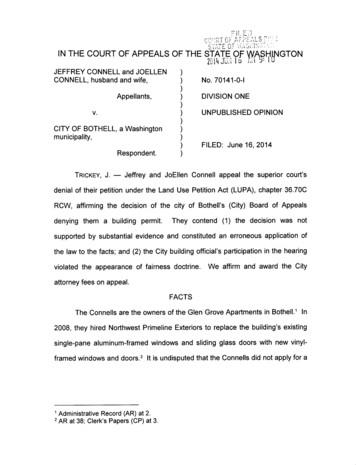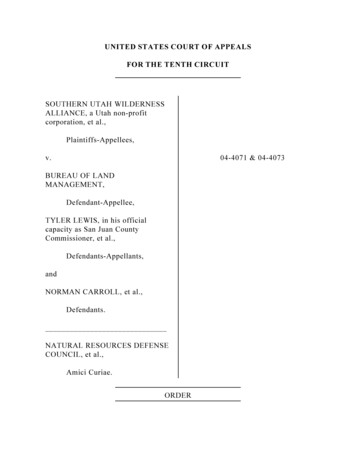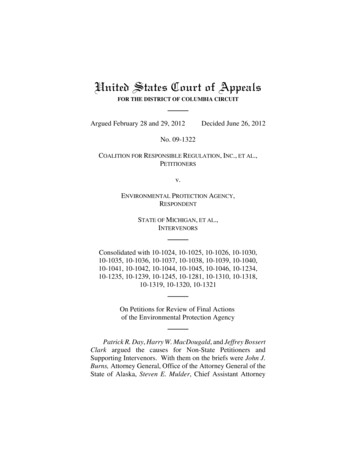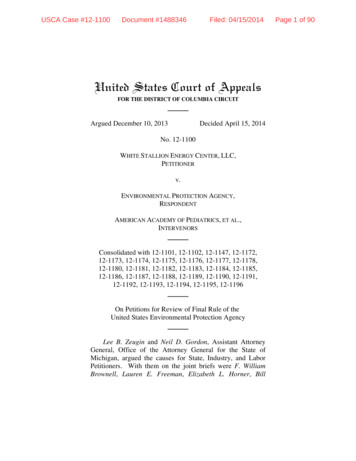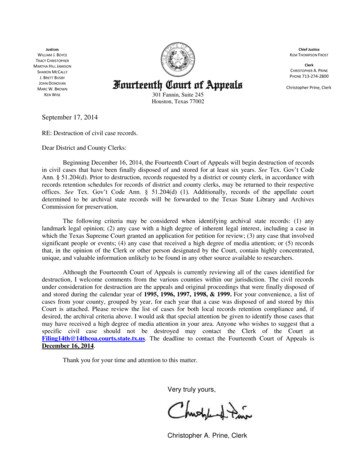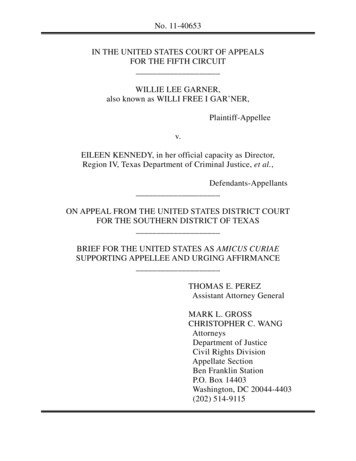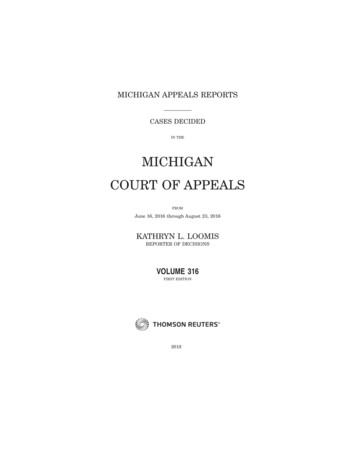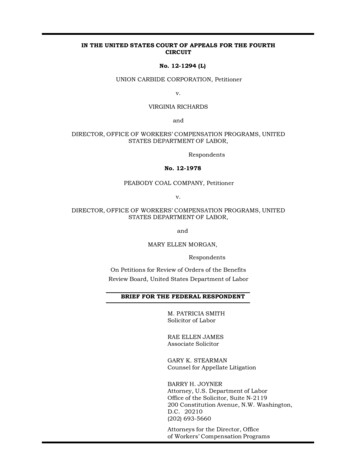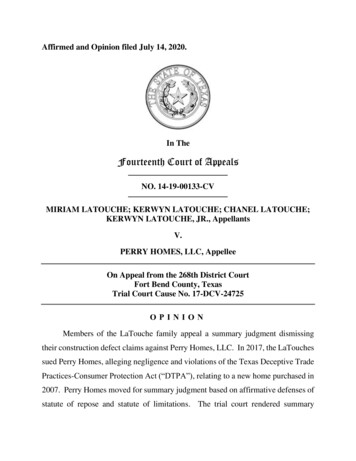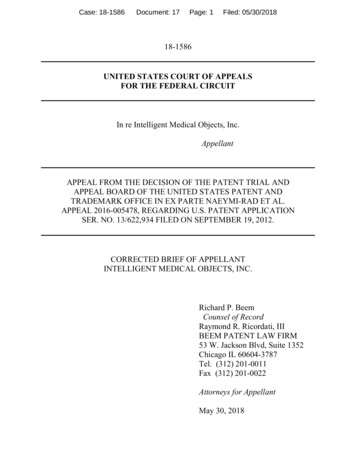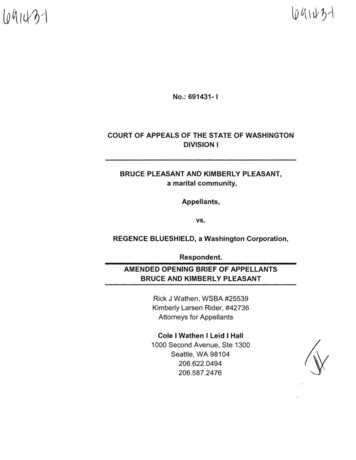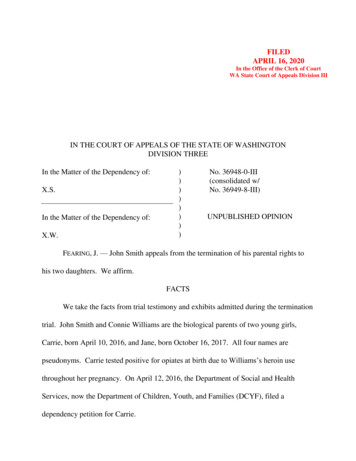
Transcription
FILEDAPRIL 16, 2020In the Office of the Clerk of CourtWA State Court of Appeals Division IIIIN THE COURT OF APPEALS OF THE STATE OF WASHINGTONDIVISION THREEIn the Matter of the Dependency of:X.S.In the Matter of the Dependency of:X.W.))))))))No. 36948-0-III(consolidated w/No. 36949-8-III)UNPUBLISHED OPINIONFEARING, J. — John Smith appeals from the termination of his parental rights tohis two daughters. We affirm.FACTSWe take the facts from trial testimony and exhibits admitted during the terminationtrial. John Smith and Connie Williams are the biological parents of two young girls,Carrie, born April 10, 2016, and Jane, born October 16, 2017. All four names arepseudonyms. Carrie tested positive for opiates at birth due to Williams’s heroin usethroughout her pregnancy. On April 12, 2016, the Department of Social and HealthServices, now the Department of Children, Youth, and Families (DCYF), filed adependency petition for Carrie.
Nos. 36948-0-III; 36949-8-IIIIn re Dependency of X.S.In late April 2016, Connie Williams burglarized John Smith’s home after adomestic violence incident between the two. Thereafter a court entered an orderprohibiting contact between Williams and Smith. In May 2016, DCYF placed Carrie withConnie Williams at Isabella House, where Williams received inpatient chemicaldependency treatment and mental health, parenting, and domestic violence services.Pursuant to the dependency in Carrie’s case, mental health therapist StevenErickson provided counseling and cognitive behavioral therapy for John Smith fromApril 2016 until Erickson’s retirement in December 2016. Erickson, in part, addressedSmith’s history of trauma and anxiety. Erickson sought to help Smith establishboundaries, improve his ability to employ impulse control, and establish trust ininterpersonal relationships.Amanda Clemons provided John Smith family therapy from April 2016 toMay 2018. Clemons counseled Smith on the need for boundaries with Connie Williamsand the importance of Smith protecting his children. According to Clemons, Smithrepeatedly denied the truth of adverse information. When confronted with increasinglydefinitive and contradictory information, Smith admitted the truth, but blamed others forhis faults. Smith blamed others when confronted with the presence of Williams in his2
Nos. 36948-0-III; 36949-8-IIIIn re Dependency of X.S.home, improperly using a car seat, and administering corporal punishment on hisdaughters. Smith continually identified himself as a victim of Williams’s behavior.On November 21, 2016, after Connie Williams successfully completed a chemicaldependency treatment program, the court dismissed Carrie’s dependency case.On December 7, 2016, an Attorney General’s office employee saw ConnieWilliams at a grocery store with one of John Smith’s older children, John Jr., who was inSmith’s care. On December 8, an unidentified individual saw Williams’s black Honda atSmith’s residence. When confronted with this information, Smith denied any contactwith Williams. He later admitted that Williams resided at his house despite her continuedsubstance abuse and the no contact order.On Christmas Day 2016, law enforcement responded to John Smith’s home basedon a report of domestic violence. Smith and Connie Williams each accused, in thehearing of officers, the other of using drugs.On December 30, 2016, DCYF filed a second dependency petition as to Carriefollowing allegations of drug use, domestic violence between Connie Williams and JohnSmith, and the parents’ failure to maintain boundaries with each other. On January 13,2017, the dependency court held a shelter care hearing and ordered Carrie placed in fostercare. The court found that illicit drugs were present in the homes of both Williams and3
Nos. 36948-0-III; 36949-8-IIIIn re Dependency of X.S.Smith and that neither parent had been honest with the court. The court also found thatSmith’s lack of impulse control and poor judgment contributed to domestic violence.Thereafter, DCYF referred Smith for family therapy and mental health counseling.DCYF also ordered Smith to submit to random urinalysis and blood alcohol testing. Thecourt entered another injunction against contact between Smith and Williams.Mental health and chemical dependency counselor Carla Paullin counseled JohnSmith after Steven Erickson’s retirement in December 2016. At DCYF’s request, Paullinfocused on Smith’s violent behavior. Paullin and Smith worked on Smith’s emotionalregulation, manipulation of others, control of others, codependency, and boundary settingin relationships. The counselor and patient discussed Smith’s self-centered nature andunstable personality features.In a March 16, 2017 order, the dependency court recognized the ultimate goal ofreunification between John Smith and daughter Carrie. The court ordered the followingservices for Smith: a parenting and attachment assessment, intensified individual mentalhealth sessions, and urinalysis only on reasonable suspicion.In a March 2017 report, counselor Carla Paullin noted she could not trust JohnSmith to be honest and to make good decisions. In an April 2017 report, Paullin alsowrote that Smith was being controlling and manipulative in regard to his relationship with4
Nos. 36948-0-III; 36949-8-IIIIn re Dependency of X.S.Connie Williams. Paullin tried to assist Smith to understand that he does not have thepower to control Williams’s behaviors.John Smith completed a domestic violence evaluation in March 2017 by TapioCounseling. During the evaluation, Smith admitted to driving dangerously with ConnieWilliams in the car, swearing at her, refusing to talk to her, issuing commands to her,spying on her, and giving her money only after she begged. The evaluator recommendedthat Smith participate in one year of domestic violence perpetrator treatment.John Smith initiated a domestic violence perpetrator treatment program withcounselor Elizabeth Rief. According to Rief, Smith often failed to appear for treatment inpart because of time spent with Connie Williams. Smith soon ceased treatment.Mental health counselor Linda Wirtz performed a parenting assessment of JohnSmith with Carrie in April 2017. Wirtz evaluated Smith as possessing good parentingskills and observed a bonded relationship between Carrie and Smith. Carrie felt secureand happy with her father. Smith responded to Carrie’s cues for a bottle, a diaper change,and a nap.On May 30, 2017, John Smith moved the court for an order to place Carrie in hiscare. In an order denying the motion, the court commissioner found that Smith withheldthe truth and impulsively made false statements only to attempt to correct them later. The5
Nos. 36948-0-III; 36949-8-IIIIn re Dependency of X.S.commissioner also found that Connie Williams and Smith violated court orders by seeingeach other. The court, nonetheless, recognized that Smith possessed the capacity toparent and render sound decisions about discipline. Smith also could provide food andclothing for Carrie. The court ordered monitored in-home visits.By September 2017, counselor Carla Paullin supported transitioning Carrie to JohnSmith’s care, because Smith never missed an appointment, he always showed care for hischildren, and he consistently asked what more could he do.On October 16, 2017, Connie Williams gave birth to Jane. Although thedependency court had ordered Williams and John Smith to refrain from contact with oneanother, the paternity results deemed Smith to be Jane’s father. After Jane’s birth,counselor Carla Paullin grew concerned that Smith could not distance himself from thechaos and drama that his relationship with Williams caused.On November 3, 2017, DCYF filed a dependency petition as to Jane becauseConnie Williams admitted to heroin use during the pregnancy and Jane showed signs ofwithdrawal from the drug. Jane required medical care for thirty days, and health careproviders administered Jane morphine while she weaned off heroin. The dependencypetition alleged that John Smith placed Jane at risk of harm because of his history ofdomestic violence with Williams and his lack of transparency with DCYF.6
Nos. 36948-0-III; 36949-8-IIIIn re Dependency of X.S.After a November 20, 2017, contested shelter care hearing, the dependency courtreleased Jane to John Smith so long as he provided a negative full-panel urinalysis andcomplied with all service requirements and conditions of previous court orders in hisdependency cases for Carrie and two older children. The shelter care hearing orderenjoined John Smith from any contact with Connie Williams, either directly or throughthird parties. Thereafter, DCYF developed a plan with Smith, which listed steps heshould take if Williams tried to contact him.In January 2018, a visitation supervisor from Love My Child conducted an inhome visit of John Smith and Jane. The supervisor saw female hygiene products andclothing in Smith’s residence. When confronted with this information, Smith denied anycontact with Connie Williams and claimed the female items belonged to his oldest child.On January 27, 2018, family therapist Amanda Clemons and Jane’s guardian adlitem Crystal Ruiz entered, without earlier warning, John Smith’s home. The two foundConnie Williams hiding under a pile of laundry. Because of the parents’ contact, DCYFremoved Jane from Smith’s care and placed the infant in shelter care.On January 31, 2018, Laura Signorino, the DCYF social worker for bothdependency cases, asked John Smith to submit a hair follicle test. Smith’s hair was tooshort to produce an adequate sample.7
Nos. 36948-0-III; 36949-8-IIIIn re Dependency of X.S.At a February 2, 2018, permanency planning hearing for Carrie, the dependencycourt changed Carrie’s primary placement plan to adoption. The court based this changeon John Smith’s lack of progress and transparency with DCYF. The court found thatSmith failed to set boundaries with Connie Williams and failed to keep his children safe.The court emphasized Williams’s continued drug use, the toxic relationship betweenSmith and Williams, and the couple’s continued contact that violated court orders.On March 23, 2018, the dependency court entered an agreed order of dependencyand order of disposition for Jane. The disposition and subsequent review orders requiredSmith to submit to a hair follicle test, submit to random urinalysis, obtain a mental healthassessment, follow the recommendations of the mental health assessment, engage in angermanagement and domestic violence prevention services, participate in family therapy, andobtain a chemical dependency assessment.Thereafter, John Smith submitted a hair follicle for testing. The sample testedpositive for heroin, cocaine, and methamphetamine. Smith denied the positive results of ahair follicle test to family therapist Amanda Clemons. In April 2018, John Smith beganchemical dependency treatment at Spokane Addiction Recovery Center (SPARC).In April 2018, social worker Laura Signorino observed text messages exchangedbetween Connie Williams and John Smith.8
Nos. 36948-0-III; 36949-8-IIIIn re Dependency of X.S.PROCEDUREOn April 25, 2018, DCYF filed a petition to terminate John Smith’s and ConnieWilliams’s parental rights to Carrie. On May 16, 2018, Smith and Williams married oneanother despite the ban on any contact.In May 2018, therapist Amanda Clemons discharged John Smith from familytherapy. Clemons concluded that Smith knew all of the strategies to make appropriatedecisions and to protect his children, but that he refused to implement those tactics. OnJuly 6, 2018, the dependency court relieved DCYF of the obligation to provide familycounseling to John Smith.In May 2018, John Smith reinitiated his domestic violence perpetrator treatmentprogram with counselor Elizabeth Rief. Smith made some progress through thetreatment.In July 2018, law enforcement arrested John Smith for allegedly striking ConnieWilliams several times on a public street. Williams suffered a swollen right eyebrow anda scratch on the back of her triceps. Williams denied the injuries and refused to bephotographed. Smith later pled guilty to assault.9
Nos. 36948-0-III; 36949-8-IIIIn re Dependency of X.S.After the July 2018 domestic violence incident, John Smith read a book oncodependency. According to counselor Carla Paullin, after Smith read the book, Smithdemonstrated some understanding of codependency.In July 2018, John Smith successfully completed his drug addiction treatmentprogram at SPARC.Michelle Druktenis supervised visits between John Smith and his daughters fromAugust 2018 to February 2019. Smith visited the girls three times a week for three hoursper visit in Smith’s home, at Druktenis’ office, or in public settings. Druktenis noted nosafety concerns at Smith’s home. According to Druktenis, oldest daughter Carrie showedmore affection toward Smith. Carrie hugged and kissed her father. Carrie asked fordaddy when Druktenis retrieved her from daycare. Because of her infancy, Janeexpressed little affection toward her father, other than sitting on his lap and giving himhugs.On October 16, 2018, DCYF filed a second petition to terminate the parents’ rightsto Jane. On January 15, 2019, one of the girls’ foster parents observed John Smith’sattempt to give Connie Williams a ride in his vehicle. Smith sped away when seen.John Smith’s progress in the domestic violence perpetrator treatment programended with a positive hair follicle test in November 2018, and with contact with Connie10
Nos. 36948-0-III; 36949-8-IIIIn re Dependency of X.S.Williams in January 2019. Both events violated Smith’s conditions of treatment.John Smith restarted substance abuse treatment at SPARC in January 2019.According to his chemical dependency treatment provider Damien Miller, Smithcomplied with the program for the two months leading up to trial in March. Millerbelieved Smith would complete his treatment in April 2019.Both termination cases proceeded to trial in March 2019. At the time of trial,Carrie was three years old and Jane was one and one-half years old. Connie Williams didnot attend trial.During the termination trial, many professionals testified about the forbiddencontact between the parents. The testimony showed that John Smith and Connie Williamsmaintained continual contact with each other despite orders banning the interaction.John Smith’s former mental health therapist, Steven Erickson, testified at trial.Erickson testified that Smith’s misbehavior related to his lack of impulse control.Erickson complimented Smith’s ability to positively interact with his children during theirmeetings. Erickson could not testify about Smith’s and Connie Williams’s relationshipbecause neither Smith nor DCYF gave Erickson any information regarding therelationship. Erickson concluded that Smith satisfactorily progressed with Erickson’streatment, although Smith could still improve on establishing boundaries.11
Nos. 36948-0-III; 36949-8-IIIIn re Dependency of X.S.Mental health and chemical dependency counselor Carla Paullin testified. Paullinexpressed surprise that John Smith’s March 2018 hair follicle test scored positive forcocaine, heroin, and methamphetamine. She also expressed concern that Smith was nothonest with her about the test results. Paullin acknowledged that substance abuse by aparent negatively affects children and may cause problems with placing Carrie and Janein Smith’s care. According to Paullin, Smith’s prognosis is guarded because of hiscontinued contact with Connie Williams. Smith knows his relationship with Williams istoxic, yet he continues to see her. Paullin testified that, if Smith wants to parent Carrieand Jane, he needs to work on impulsivity, boundaries, and transparency. Paullin testifiedthat domestic violence in the home is the number one source of trauma on children.Paullin wishes Smith to forego contact with Williams for one year before either daughterreturns to Smith’s home.Family therapist Amanda Clemons also testified. Clemons opined that Smith’swillingness to allow his daughters to spend time with Connie Williams, someoneconsistently under the influence of drugs, harms the girls and endangers their safety.Clemons added that John Smith lacked insight into how his repeatedly engaging inunhealthy relationships, acting impulsively, and lack of honesty with his providers12
Nos. 36948-0-III; 36949-8-IIIIn re Dependency of X.S.harmed his children. Clemons could not support placement of Carrie and Jane withSmith.Elizabeth Rief, John Smith’s domestic violence perpetrator treatment programcounselor, testified that John Smith did not successfully complete the program. Mentalhealth counselor Linda Wirtz testified that Smith posed a low risk of danger to hisdaughter, Carrie.DCYF social worker Laura Signorino testified that John Smith complied with mostservices, but he failed to progress as a result of the services. Signorino opined that Smithhad not corrected his parental deficiencies. According to Signorino, DCYF continued toworry about Smith’s lack of boundaries with Connie Williams, his lack of transparency,his assaults on Williams, his illicit drug use, and his lack of insight into his deficiencies.The domestic violence and drug abuse substantially impacted Smith’s ability to protectand care for his daughters. Otherwise, Smith possessed basic parenting skills. LauraSignorino opined that continuing the parent-child relationship between Smith and hisdaughters may confuse the girls and hinder their ability to transition to a permanent home.Guardian ad litem Crystal Ruiz testified that, as of March 5, 2019, Carrie and Janethrived in their respective home placements. She explained that, although the girlsresided in different homes, the families met together and the girls had play dates.13
Nos. 36948-0-III; 36949-8-IIIIn re Dependency of X.S.According to Ruiz, both girls deserved permanency and a chance for a stable life.Despite Carrie’s attachment to Smith, Ruiz did not recommend continued contactbetween Smith and either of his daughters.John Smith testified at the termination trial that he learned from the servicesprovided by DCYF. He explained that domestic violence is not only physical, but can befinancial and emotional. He learned about codependency with Connie Williams and howthe phenomena influenced his behavior. He learned that heroin is more addictive thancocaine or alcohol. Smith still denied any assaultive behavior.John Smith testified he went long periods of time without contact with ConnieWilliams. He did not quantify the time. Smith claimed that Williams occasionally calledDCYF and asserted false allegations against him because he refused contact with her.Smith acknowledged that Williams was pregnant again and he might be the biologicalfather.John Smith testified that he would no longer pursue a relationship with ConnieWilliams because she has chosen heroin over her own children. Smith acknowledged hismarriage to Williams in May 2018, but insisted he had filed for divorce.The trial court terminated John Smith’s and Connie Williams’ parental rights toCarrie and Jane. The court entered the following findings of fact:14
Nos. 36948-0-III; 36949-8-IIIIn re Dependency of X.S.There is little likelihood that conditions will be remedied so that thechildren can be returned to the parent(s) in the near future.The father, Mr. [Smith], had periods of both compliance andnoncompliance with most of his services. However, ultimately, Mr. [Smith]has failed to apply the advice provided to him in services to his own life andto the decisions he makes regarding his children’s safety. . . Ms. Paullin stopped counseling with Mr. [Smith] after two yearsbecause she felt she had done all she could—he was not applying thetechniques provided in counseling to his life, and any future change wouldbe up to him.It is in the children’s best interests to terminate the parent-childrelationship. Ms. [Williams] has never remedied her drug issue.
Connie Williams at Isabella House, where Williams received inpatient chemical dependency treatment and mental health, parenting, and domestic violence services. . chemical dependency treatment at Spokane Addiction Recovery Center (SPARC). In April 2018, social wo
